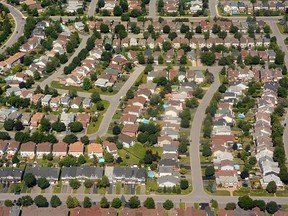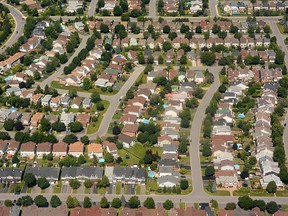Labour shortages and lagging productivity challenges to the goal of building 500,000 homes a year

Article content

Article content
Article content
The Liberal Party of Canada has dubbed its housing proposal the “most ambitious” plan since the Second World War, but labour challenges and a lack of productivity in the housing sector may make its targets hard to reach.
On Monday, Liberal Leader Mark Carney announced a plan his party says will double the pace of housing construction to 500,000 homes per year, which includes the federal government acting as the developer to build affordable homes at scale, $25 billion in financing for prefabricated homes and offering $10 billion for builders of affordable homes.
Advertisement 2
Article content
Carney is also pledging to spur housing development by cutting red tape, providing tax incentives and transforming existing buildings into housing projects.
“We’re going to build homes Canadians can afford, and a new industry that can take on the world,” Carney said in a news release.
There’s no doubt Canada needs to ramp up housing construction if the country is to rein in high housing prices, but how feasible is Carney’s plan?
In 2024, the Canada Mortgage and Housing Corporation (CMHC) estimated that despite record workers in the skilled trades, Canada has the potential to build only about 400,000 units per year, 100,000 new homes a year below Carney’s target.
That same year, Desjardins estimated that regulatory hurdles and constraints on labour, materials and financing would hamper Canada’s chances of reaching the CMHC’s housing affordability target of 5.8 million new homes by 2030.
Article content
Advertisement 3
Article content
In 2022, the CMHC also estimated that Canada does not have capacity to meet its own affordability goals, as Ontario, Quebec, Alberta and British Columbia are only able to boost capacity by 30 to 50 per cent.
A 2024 report from BuildForce Canada estimated that in order to meet the CMHC’s goals, Canada will need to expand its residential construction work force by 83 per cent from 2023 levels to just under 1.04 million workers.
Carney’s plan does not address the construction labour shortage.
Housing starts in Canada rose two per cent to 245,120 housing starts, In February of this year they fell by four per cent.
The New Democratic Party on the weekend also announced a plan aimed at housing affordability with government-backed low-interest loans to first-time homebuyers through the CMHC.
Advertisement 4
Article content
This new program would allow options to Canadians who qualify for a mortgage but can’t afford the bank rates.
“It’s never been done before, but if we can give loans to large, wealthy developers to buy buildings, to buy homes, why can’t we give everyday families a break?” NDP leader Jagmeet Singh told reporters over the weekend.
Robert McLister, an interest rate analyst, mortgage strategist and contributing writer for the Financial Post, called government subsidized mortgages a “terrible idea,” arguing they would drive up home costs, could encourage over-borrowing and could hike Canada’s overall debt financing costs.
“The population slowdown, higher rates, economic uncertainty and existing initiatives are already doing a far better job of managing housing affordability than this proposal could ever do,” he said in an email.
Advertisement 5
Article content
This weekend’s promises
- Conservative Leader Pierre Poilievre is promising to build a national energy corridor to fast-track infrastructure approvals, including pipelines and railways.
- Poilievre also announced a tax cut on capital gains that would allow anyone selling an asset to avoid taxes if the proceeds are reinvested in Canadian businesses.
- Poilievre is also planning to make food, transportation and accommodations a tax write-off for travelling trades people, while ending the tax breaks for private jet usage.
- Liberal leader Mark Carney announced a $5 billion fund to build the infrastructure needed to reduce Canada’s reliance on the U.S. for trade.
- NDP Leader Jagmeet Singh is promising to offer low-interest, publicly-backed mortgages through the power of the Canada Mortgage and Housing Corporation (CMHC).
- Singh would also impose an emergency cap on grocery prices for basic food items.
- The Green Party is calling for the federal government to buy resources at market prices and keep them in reserve until needed as the trade war threatens to raise prices.
- The Bloc Québécois released its platform on Saturday, which includes calls for free trade agreements to come before a House of Commons vote, a Quebec delegation to represent the province’s interests in free trade negotiations, would force property owners to keep property they buy for two years and “major” support for first-time homebuyers.
Advertisement 6
Article content
Election headlines
Recommended from Editorial
• Email: bcousins@postmedia.com
Bookmark our website and support our journalism: Don’t miss the business news you need to know — add financialpost.com to your bookmarks and sign up for our newsletters here.
Article content









